
Webinars
LEADING IN TIMES OF CHANGE | Andrew Berghamar
What are the main challenges of church leadership as we move forward from our present situation in Europe? How do we view the virtual as against the physical in biblical terms as a milieu for church life and evangelism? How should we return to physical church life, to what extent should we return from virtual church to physical church, how should physical church be different going forward, taking into account what we have learned during the pandemic; how do we carry forward and not lose what we have profited from during lockdown?
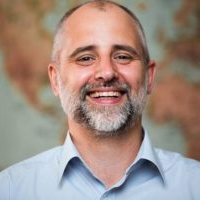
Andrew Berghamar is 49 year old, married to Sara and father of five. He is half Faroese and half British, but has been living in Denmark for most of his life. Andrew and Sara have been serving in Skovlunde Freechurch, in the outskirts of Copenhagen, for 7 years. Besides this, Andrew was formerly the Danish fieldleader of Operation Mobilisation (OM) for 10 years. Andrew has a masters degree in Religious studies from Copenhagen University, loves reading and loves football, especially Manchester United.
REDISCOVERING LAMENT | Simon Marshall
It is significant that the Bible has one whole book dedicated to lament. It is also significant that in the collection of songs that form the heart of worship in the Bible, the most common of the psalms is that of lament. Especially for those of us who have been born in the West, the language of lament has not been one which we have used often – or perhaps often felt the need for. The fact that for a large proportion of Christians in the West, life is generally reasonably comfortable, seems to have led to our losing our ability to deal with suffering biblically. In other words, our theology of suffering is poor. This webinar will explore how we might recapture the biblical genre of lament for today’s Europe.
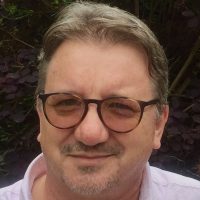
Simon Marshall has been a teacher, church pastor and Principal of Tilsley College in Scotland. He is now the International Director for European Christian Mission International. He was brought up in the south-east of England but has lived in the Faroe Islands, France, India and Czech Republic as well as Scotland. He is married to Dorit and they have two children and five grandchildren.
MAKING MISSIONAL DISCIPLES| Sébastien Brandt
In his early thirties, Jesus of Nazareth started a journey that would change the world forever. What was the first step of Jesus’ earthly ministry as described in the gospels? Choosing a team of followers. There is no doubt that the Son of God was fully equipped to do the job by himself. After all, Jesus had at his disposal his Father’s legions of angels (Matthew 26:53); he was not without resources. However, he chose broken men and women to participate in the most incredible rescue plan in history. This webinar will try to analyze Jesus’ methodology in building his team (making disciples) and the implications for our churches today. Making disciples is a well-known concept that has inspired thousands of books and articles worldwide throughout Christian history. Nevertheless, do we practice this concept in our daily life? In our families? Churches? Bible Colleges? At work? Is the Great Commission falling into a subcategory of our church activities, or do we strive to keep this command at the centre of who we are?
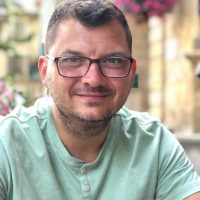
Sébastien Brandt and his wife Jess have with 3 children Sharleen, Emy and Julien. They come from France and they have been living in Scotland since 2015. Seb holds a degree in Computer Science, and a Masters Degree in Theology from LST. He is the Spiritual Development Tutor of Tilsley College as well as being one of the lecturer. He also preaches in a lot of different Churches. As a couple, Seb and Jess have a ministry of mentoring and pastoral care. They are members of Kings Church Motherwell. Thanks to Jess’s Italian roots, they all speak Italian as well as French and English. They love traveling, going on mission trips, learning from new cultures and to spend time with friends.
WHO IS CHRIST FOR US TODAY? | Frédéric Walraven
The common human reaction in a time of trouble is to look how to get out of it as soon as possible. Whenever this situation lasts longer than expected, signs of discouragement and depression may threaten us. As Christians in a time of a pandemic, we are not only challenged to persevere and remain faithful, but also to make the most of this time.
In this webinar we will look at Jesus, the pioneer and perfecter of our faith, so that we will not grow weary and lose heart. Together we will explore the meaning of the three offices of Christ as prophet, priest and king for us today. Taking a fresh look at Christ will bring encouragement to our souls, strengthen our faith, and motivate us to bring Christ to a world without hope.
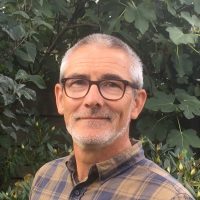
Frédéric Walraven and his wife Siglinda are both from the Netherlands. They have lived in Switzerland where Frederic worked as mechanical engineer. After seven years they made a career switch to become missionaries to Cameroon where they served for fourteen years in biblical teaching and churchplanting. Since 2009, they live again in the Netherlands from where Frederic has an international ministry as teacher and trainer. Together they have three children and three grandchildren.
MARRIAGE TODAY | Dr Marius Marici
In recent decades, Christian families have been influenced by secular trends, and this has created major difficulties for marriages. As a psychotherapist, working for two decades with children, couples and adults, I have noticed, in the light of the Bible, three main reasons why Christian families fail to develop, solve conflicts and live the life that God intended for spouses. These three findings, which will be presented in the introduction raise the question of what advice Christian leaders can give to encourage church members to build loving and lasting Christian marriages.
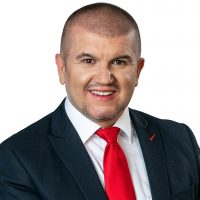
Dr Marius Marici is an associate PhD professor at the Faculty of Education Sciences in Suceava and teaches interpersonal relations. He is married to Carmen Marici and they have 3 beautiful children together. He is on the board of the Diakonia church, where he is in charge of the education department and partly preaching, and on the national board of the Christian organization Romanian Academic Network. In addition to university activity, he invests in the organization ‘Parent and Child Training’, through which he helps parents and children, but also spouses to find the best solutions to their problems and their social, psychological and Christian development.
He did research on the field of parent-adult relationship and published 9 books. He was a postdoctoral researcher at the ‘Romanian Academy’ where he did research on the development of children’s resilience. He was a teacher of English for 13 years at High School. He resigned after and he did a professional reconversion in parenting, with the purpose to help families thrive and honor God. He is an ‘autonomous couple and family psychotherapist’. He counsels especially on the relations between husband and wife or on various issues such as conflicts, spouse neglect, parenting, relationship fidelity issues or broken marriages.
EXCUSE ME, DO YOU SPEAK (MY KIND) OF CHRSITIAN? | Dr Andrzej Turkanik
WITNESSING TO ENVIRONMENTALLY VIGILANT, SOCIALLY SENSITIVE, AND AESTHETICALLY MINDFUL YET BIBLICALLY ILLITERATE GENERATION Christian witness is massively under the assault for being anti most values our society holds dear (absolute freedom, equality, liberalism, gender and sexuality, environment). How do we enter into conversation without being dismissed as bigots and moralists? This session aims at helping (1) to understand our moment in time, particularly in the Western world, where major social shifts are taking place. In the course of our time together we will (2) look at some of the major challenges to biblical worldview from the secular perspective. Then we will (3) consider how Paul’s example might be helpful in finding ways to building connections. Lastly (4) we will study some practical approaches and draw conclusions as to the application.
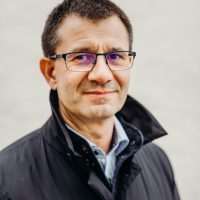
Dr Andrzej Turkanik, a native of Poland, born and raised during the Communist regime, completed degrees in music and art in Poland as well as theology in Germany, before earning Ph.D. in Oriental Studies from Cambridge University (UK). The Quo Vadis Institute, of which he is Executive Director, is dedicated to helping ask the questions as to what true human flourishing means in the changing societal landscape in Europe and the Western World and how cultural renewal can be stimulated. Dr Turkanik and his wife have three children. They reside in Salzburg, Austria.
